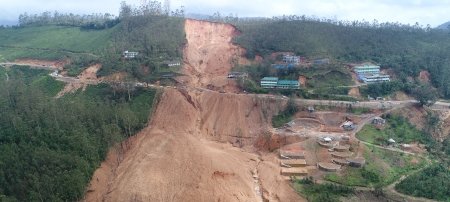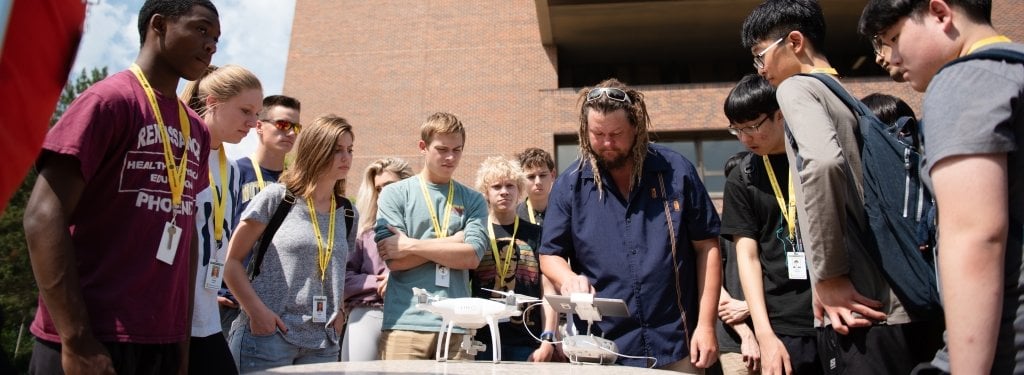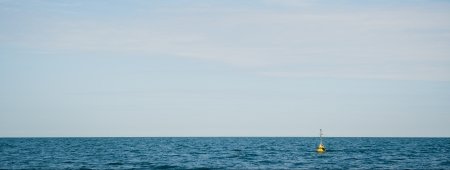PEER Program Crosses Borders to Save Lives

On Nov. 9, 2009, Hurricane Ida dumped 18 inches of rain on the northern slopes of the extinct San Vicente volcano. The already rain-soaked mountain could hold no more and gave way.
The massive mud and debris flows that followed killed nearly 400 people. Since then, researchers from Michigan Technological University and the University of El Salvador—Multidisciplinary Faculty of the Central Region, San Vicente, have been working together to mitigate the human toll in future catastrophes.
Fredy Cruz, director of graduate studies and an agronomy professor at the San Vicente campus, came to Houghton last week to collaborate with Michigan Tech scientists and attend a workshop on remote sensing and hazard modeling. “We’re working to identify areas that are susceptible to landslides and flooding, and we’re also trying to identify those communities that are the most vulnerable, not just geographically, but also economically,” he said.
The San Vicente region has a history of disasters, including landslides, flooding and earthquakes. “The University of El Salvador needs to research ways to address these issues,” Cruz said. “This project is strengthening our efforts to address those hazards, but the ultimate beneficiaries are the local governments, emergency responders and the people in our communities.”
The collaboration is sponsored by USAID and the National Science Foundation through the Partnerships for Enhancing Engagement in Research, or PEER, program. Cruz was joined at Tech by master’s graduate Luke Bowman, a returned Peace Corps volunteer and now a PhD candidate in geology, who has been working with Cruz in San Vicente and served as Cruz’s interpreter. Rudiger Escobar Wolf, a Michigan Tech PhD candidate in geology from Guatemala, and José Marrero, an undergraduate geology major from the University of Puerto Rico at Mayaguez, are also part of the cooperative effort, along with John Gierke, professor and interim chair of the Department of Geological and Mining Engineering and Science.
Bowman and Rudiger led the workshop in Spanish, which focused on using remote sensing to map hazard risks and vulnerability. The team focused on processing satellite imagery to identify changes in land use over time, to determine how those changes might play into landslide and flooding hazards.
In addition to training and exchange of knowledge, PEER allows Cruz’s team to purchase equipment, both for hazard mitigation and to further research and education. Items include well-monitoring sensors, computers and hardware for an advanced technology classroom.
The PEER program also provides extraordinary opportunities for international students, Gierke added. “I always find these exchanges exciting,” he said. “The students we attract to Michigan Tech and the interns, like José, who come here for short periods are so hard working and adventuresome. We are so grateful that they have the courage to come to this relatively unknown place and work with us in these research endeavors.”
PEER is a synergistic program that awards funds to foreign counterparts of internationally focused NSF projects, like the first of Michigan Tech’s Partnerships in International Research and Education (PIRE). PIRE supports Michigan Tech scientists’ travel to El Salvador. In March, Bowman and Gierke worked with Cruz installing instruments to monitor groundwater levels in San Vicente. “Over time, we’ll be going back and forth disseminating techniques for modeling,” Gierke said.
The international exchange wasn’t limited to technology. Cruz’s interest in agriculture prompted a tour of local farms. After hours, his hosts took him fishing on Portage Lake and introduced him to grilled venison. “Everyone has been welcoming, and I feel right at home,” Cruz said. “And today, it’s so hot it feels almost like San Vicente.”
Michigan Technological University is an R1 public research university founded in 1885 in Houghton, and is home to nearly 7,500 students from more than 60 countries around the world. Consistently ranked among the best universities in the country for return on investment, Michigan's flagship technological university offers more than 185 undergraduate and graduate degree programs in science and technology, engineering, computing, forestry, business, health professions, humanities, mathematics, social sciences, and the arts. The rural campus is situated just miles from Lake Superior in Michigan's Upper Peninsula, offering year-round opportunities for outdoor adventure.




Comments